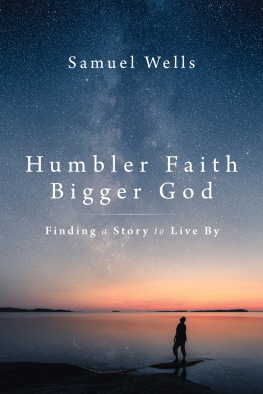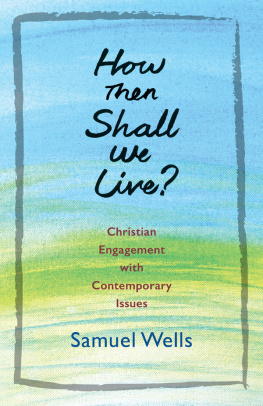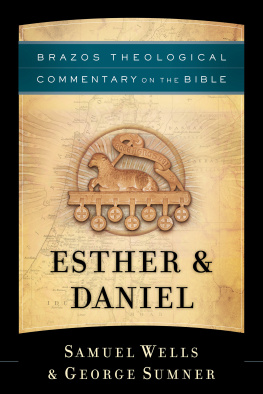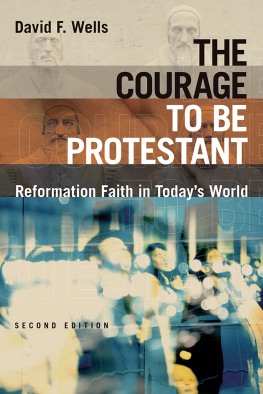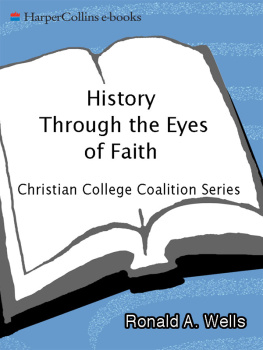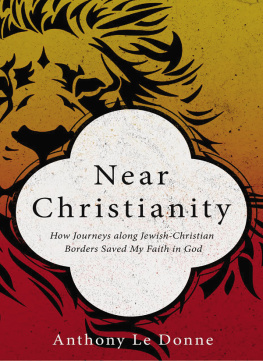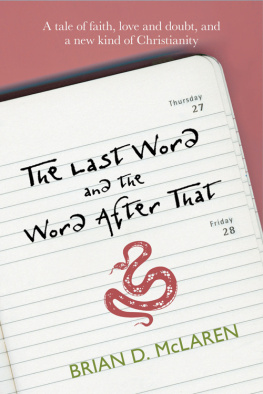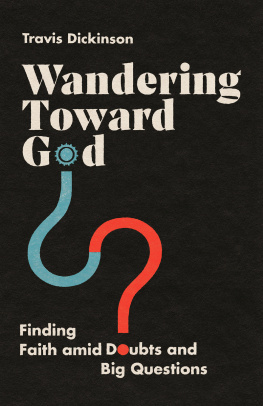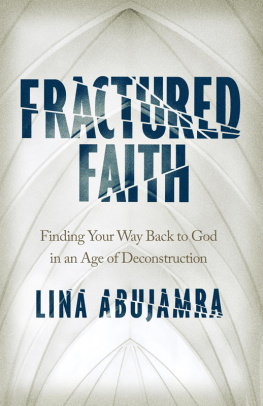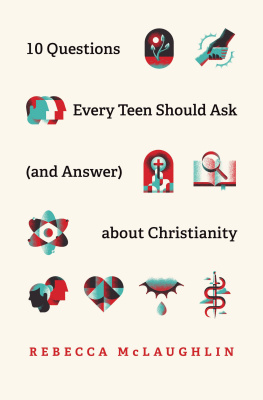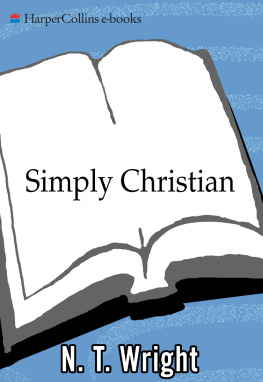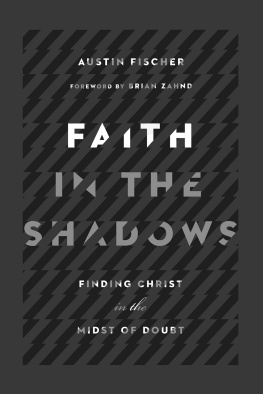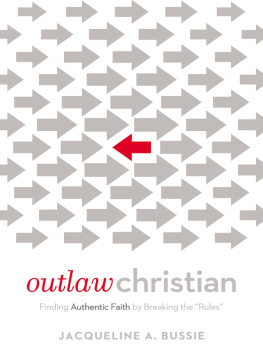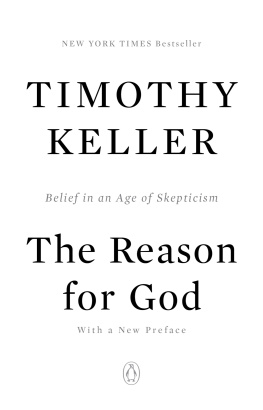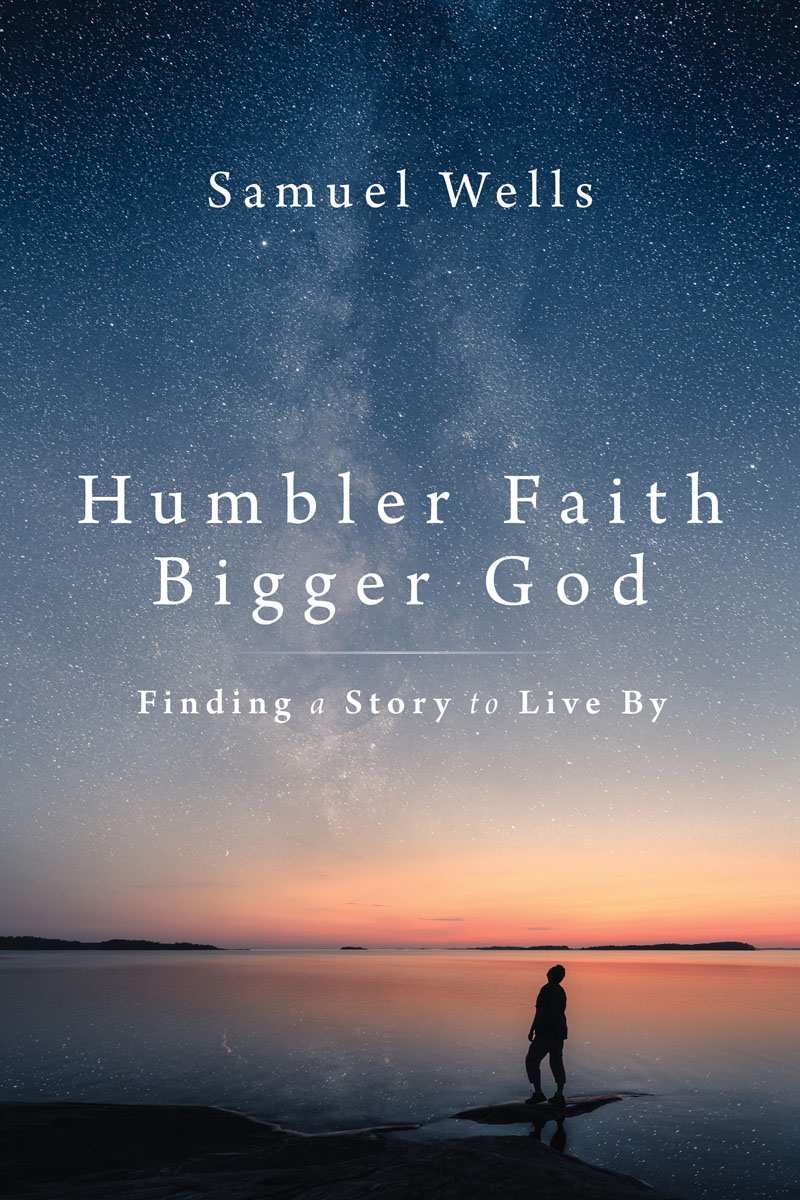

Wm. B. Eerdmans Publishing Co.
4035 Park East Court SE, Grand Rapids, Michigan 49546
www.eerdmans.com
2022 Samuel Wells
All rights reserved
Published 2022
Printed in the United States of America
28 27 26 25 24 23 22 1 2 3 4 5 6 7
ISBN 978-0-8028-7931-8
Library of Congress Cataloging-in-Publication Data
Names: Wells, Samuel, 1965 author.
Title: Humbler faith, bigger God : finding a story to live by / Samuel Wells.
Description: Grand Rapids, Michigan : William B. Eerdmans Publishing Company, [2022] | Summary: A reframing of Christianity that portrays traditional belief and the response of skepticism as two rival stories and offers a third story that incorporates doubts and failures into a renewed understanding of Christian faithProvided by publisher.
Identifiers: LCCN 2021041070 | ISBN 9780802879318
Subjects: LCSH: Apologetics. | ChristianityControversial literature. | StorytellingReligious aspectsChristianity. | BISAC: RELIGION / Christian Theology / Apologetics | RELIGION / Christian Theology /General
Classification: LCC BT1103 .W45 2022 | DDC 239dc23
LC record available at https://lccn.loc.gov/2021041070
For Lola and Harry
CONTENTS
PREFACE
I M A PREACHER BEFORE I M A WRITER . Im grateful to James Ernest and David Bratt for watching a recording of my Easter Sunday 2020 sermon at St. Martin-in-the-Fields and seeing in it the embryo of a book, and then abiding as I pondered carefully how that could come to pass. Im especially thankful for Ruth Taunt, whos made these chapters a personal pilgrimage and has, through comment and conversation, put me in touch with how deeply these questions matter. Im grateful too to Steph Wells, who helped me identify what the book was really about. Im glad for conversations with Octavia Stocker, without which one topic in particular would never have surfaced; with Frances Stratton, who was especially helpful with articulating the ten key questions; with Gabriella Noble, who added finishing touches; and with Karl Travis, who urged me on as he counted the days. Ray Barfield, Stanley Hauerwas, and Maureen Knudsen Langdoc have been cherished conversation partners throughout; the kind who say, The manuscripts fine, but you cant publish it if you use that single word here and that phrase there. John Inge and Farley Lord kindly took time to read every word and make helpful, insightful, and encouraging comments: such readers scrutiny is a precious gift to any writer.
I cant imagine this book outside of three contexts with which Ill always associate it. The first is the company of Jo, Laurie, and Steph Wells, who contrived to make the desert of the pandemic bloom, and with whom I found blessing, peace, and space to think and write when all around was tense, troubled, and tearful. The book was born in the first lockdown, on long sunny spring days when the positives of the disruption still kept pace with the tragedy. It became a lifeline later in the year when the skies were granite gray and the mood was darker still.
The second context is the emerging Being With course, imagined with my colleague Sally Hitchiner. Devising, delivering, and developing the course together, and sharing training and participation with a cloud of witnesses in London, the United Kingdom, and across the world, made questions of faith more central to my ministry in 2020 than perhaps at any other time, and provided the practice to which writing this book offered the theory. I am grateful to everyone involved in this process for giving me so many experiences of grace.
The third context was of the extraordinary colleagues, congregation, and community with which I have been blessed at St. Martin-in-the-Fields. I believe in the church because of the solidarity, improvisation, resilience, and goodness I have witnessednever more so than in 2020 in this place. I want to be a Christian because I want to keep the company of people like thispeople who turn grief into possibility, trial into opportunity, sorrow into dancing. I write of Christianity with confidence because of the dignity I have seen in the face of adversity, the glory I have felt amid hardship, the love I have met despite pain. These people are a better argument for the truth of Christianity than this book could ever be.
Many of the themes in these chapters Ive pursued elsewhere. The notion of essence and existence in , is the leitmotif of Be Not Afraid.
In the more likely event that this book leads the reader not to pursue my other publications but to find people who do a better job than me, the four extraordinarily different books that have influenced me the most are as follows. It turned out I began writing this book just after reading Tom Hollands Dominion: How the Christian Revolution Remade the World (New York: Basic Books, 2019), and I found Toms research, argument, and illustration wonderfully compelling as a backdrop to my own project. I first read Stanley Hauerwass The Peaceable Kingdom: A Primer in Christian Ethics thirty years ago. Hed be the last to consider it a book doing what this book sets out to do; but its chapter on Jesus I virtually committed to memory, and it worked on me as a powerful call to faith. The book was important for me because it so clearly recognized what was wrong with Christianity but still offered a constructive, intelligent faith: which is what Im seeking to do here. It would be hard not to be stirred by David Bentley Harts Atheist Delusions: The Christian Revolution and Its Fashionable Enemies (New Haven: Yale University Press, 2009): its erudition, humor, and polemical agility are second to none. If your concern is the challenge of the so-called New Atheists, its the best book in the field. You want Hart on your team if you find yourself in an argument. Finally, Vincent Donovans Christianity Rediscovered (London: SCM, 2001) continues to be, for me, the most inspiring argument available for the practical workability of Christian faith.
The book is dedicated to two friends whove walked with me through many tender moments and great adventures. The kingdom of heaven is made of such as these.
INTRODUCTION
W E LIVE OUR LIFE IN STORIES , but it often takes a clash of stories, or a dramatic event that we cant reconcile with our sense of story, to realize it. Thus the covid-19 pandemic burst into the story the world thought it was inreshaping that story with much greater attention to mortality, public cooperation, and disruption than almost anyone hitherto thought possible or necessary. And during the pandemic there was a constant struggle for storyan impatient need to feel near the end, a reluctance to recognize that things might get worse before they got better, a desire for heroes and rapid cures. Likewise, the Black Lives Matter movement highlighted that the story of America, of the world, was not, as conventionally told, everyones story; it was still being told, too often and without censure, as a partial story for some and not others. Meanwhile the climate crisis repeatedly highlighted that the human story, let alone the planets story, would not automatically continueat least not without urgent action and a change of heart and lifestyle.
This is a book about stories. It recognizes a time, largely past, but not so long ago, when a story known as Christianity was widely understood, in the West, as a largely unquestioned story, or fundamental part of a cultural story, such that belief in its doctrines and trust in its ways were a normal, unproblematic default, and to call oneself a Christian was to subscribe to a reasonable, plausible, or beneficial structure of authority and morality. It appreciates that a rival story has emerged over the last 250 years, and particularly over the last 60 years, which could broadly be termed secular humanist, and which has changed the template on which trust and conviction rest. This story assumes that to follow a controversial figure from 2,000 years ago, and see him as the focal point for all reality and the face of forever, runs against todays conventional wisdom. Thus Christianity is shorn of its identity as a benign bedrock and now increasingly appears to be many less agreeable thingsjudgmental, small-minded, absurd, bigoted, foolish, and plain wrong. Just as Christianity once failed to realize it was a story but imagined itself to be normal, sane, and wise, so the rival story has come to consider itself in similar unreflective terms.
Next page
